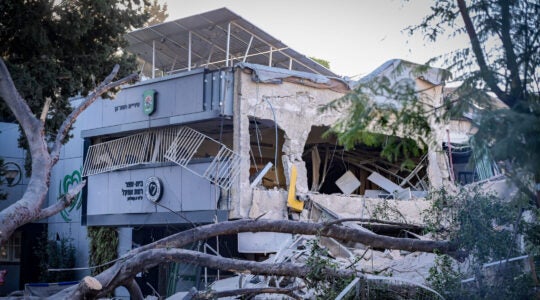WASHINGTON (JTA) — The red line that would prompt Israeli military action in Syria would be the establishment of Iranian military bases there, Israeli Defense Minister Avigdor Liberman said.
“A military presence we will not allow,” Liberman said here Friday at the Washington Institute for Near East Policy, a think tank friendly with Israel. “What we will not allow is for Iranians to establish a forward base in Syria against Israel.”
Liberman said that was presently not the case, suggesting that the Iranian presence was currently limited to “advisers” to the Assad regime in its seventh year of attempting to quell a civil war, and to drug-runners.
Liberman, who is on an official visit, met in recent days with Defense Secretary James Mattis and National Security Adviser John Bolton. He said the Trump administration understood Israel’s red lines in Syria.
“There is an understanding to our concern regarding the situation in Syria,” he said. Liberman, who has in the past expressed concerns about President Donald Trump’s plans to pull back the U.S. presence in the Middle East, would not comment on what he thought of Trump’s recently stated plans to pull some 2,000 U.S. troops out of Syria.
“I am not in a position to give advice to the American administration,” he said.
He nonetheless decried the 2015 Iran nuclear deal. Trump has hinted he will pull out of the deal, which swaps sanctions relief for a rollback in Iran’s nuclear program, by next month, although Mattis said this week he believes the deal is working, and the foreign leader Trump is closest to, French President Emmanuel Macron, this week defended the deal in a speech to Congress.
“I think the West has grown soft, has lost their political will and determination,” Liberman said, “and the deal with Iranians is something I cannot understand.” Israeli Prime Minister Benjamin Netanyahu, like Trump, believes the deal is a bad one.
Liberman also said the idea of peace with the Palestinians was an illusion.
“Real peace is an illusion,” he said. “I think it’s something nonrealistic.”
He blamed the state of Arab society generally, noting tensions and wars between Arab nations and economic disparities in Arab countries.
“The main problem in the Middle East, in Arab society, is that the middle class doesn’t exist,” he said.
He said that if there ever was to be a solution to the Israeli-Arab conflict, it would have to be comprehensive, encompassing Israeli-Palestinian relations, broader relations between Israel and the Arab world, and a “solution” for Israeli Arab citizens.
“We should sign with the Arab league with the Palestinians and to find a solution with the Israeli Arabs,” he said.
Liberman, the leader of the Israeli Beitenu Party in the ruling coalition, has in the past suggested transferring Israeli Arab towns to Palestinian rule, a plan that has been denounced as racist by centrist and liberal parties in Israel.
JTA has documented Jewish history in real-time for over a century. Keep our journalism strong by joining us in supporting independent, award-winning reporting.






